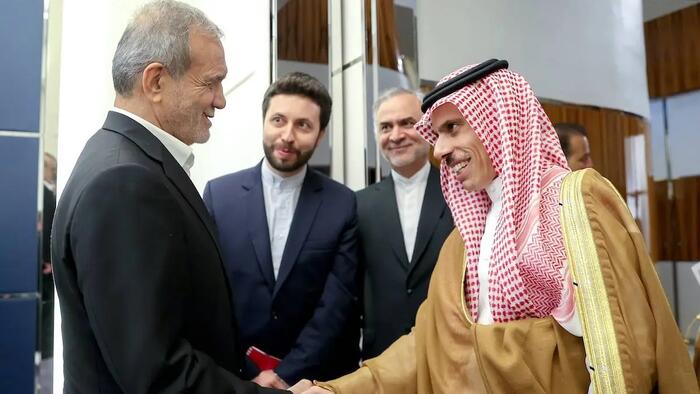Saudi Arabia, the world’s largest oil exporter, has recently reaffirmed its commitment to neutrality amid escalating conflicts in Lebanon, Gaza, and Yemen, as well as the ongoing confrontation between Iran and Israel. The Saudi Arabian government has expressed a desire to remain on the sidelines, a position echoed by other Gulf Cooperation Council (GCC) members, including Qatar, the United Arab Emirates, Bahrain, Oman, and Kuwait. As tensions rise in the region, these nations have sought to portray themselves as neutral actors in the broader conflict involving Iran and Israel, hoping to maintain stability and protect vital oil interests.
The backdrop of this neutrality is significant, especially considering the recent trajectory of Saudi-Israeli relations. Prior to the outbreak of the war in Gaza on October 7, Saudi Arabia was reportedly on the verge of normalizing diplomatic relations with Israel as part of the Abraham Accords. However, the onset of violence disrupted these negotiations, forcing Saudi Arabia to reassess its position in the changing geopolitical landscape. Simultaneously, the kingdom has been working to mend ties with Iran, striving to affirm its non-alignment in the Iran-Israel confrontation and thereby stave off potential destabilizing actions that could threaten the security of its oil production.
Recent diplomatic exchanges underline this commitment to dialogue and de-escalation. During a meeting in Doha on October 3, 2024, Iranian President Masoud Pezeshkian and Saudi Foreign Minister Faisal bin Farhan Al-Saud discussed the importance of cooperation among Islamic nations. Pezeshkian emphasized the need to transcend differences, highlighting the importance of mutual respect and collaboration. In response, bin Farhan echoed these sentiments, expressing Saudi Arabia’s intent to advance relations with Iran while resolving outstanding issues peacefully and constructively.
The geopolitical situation is compounded by heightened tensions and increased volatility in global oil markets. Each significant development in the region, especially concerning potential strikes by Israel on Iranian oil facilities, causes fluctuations in oil prices. The recent statements from U.S. President Joe Biden, seeking clarity about the implications of Israeli military actions on Iranian oil infrastructure, reflect broader concerns over the stability of global energy supplies. The interconnectedness of regional conflicts and oil markets means that any conflict-related action could have immediate and profound consequences on remaining global oil supplies.
Historically, relations between the GCC states and Iran have been fraught, particularly following the Syrian Civil War, where the GCC actively opposed Iranian influence by supporting various rebel factions. However, as the Syrian government regained control, there has been a noticeable shift in diplomatic strategy. The need for pragmatism and reconciliation among regional players has grown more apparent, leading to a thawing of relations. GCC countries have moved to engage in diplomatic avenues with Iran, placing greater emphasis on cooperation rather than confrontation.
In conclusion, Saudi Arabia’s stance of neutrality, coupled with the supportive approach from other GCC nations towards Iran, reflects a strategic choice aimed at sustaining regional stability and protecting national interests amidst rising tensions. The complexities of modern geopolitics ensure that oil production and diplomatic relations remain intertwined, rendering the pursuit of peace and cooperation vital not only for the Gulf states but for the wider international community, whose economies are dependent on stable oil flows from the region. As such, ongoing dialogue and diplomatic efforts will be essential for navigating the turbulent landscape of Middle Eastern politics and ensuring sustainable peace.

